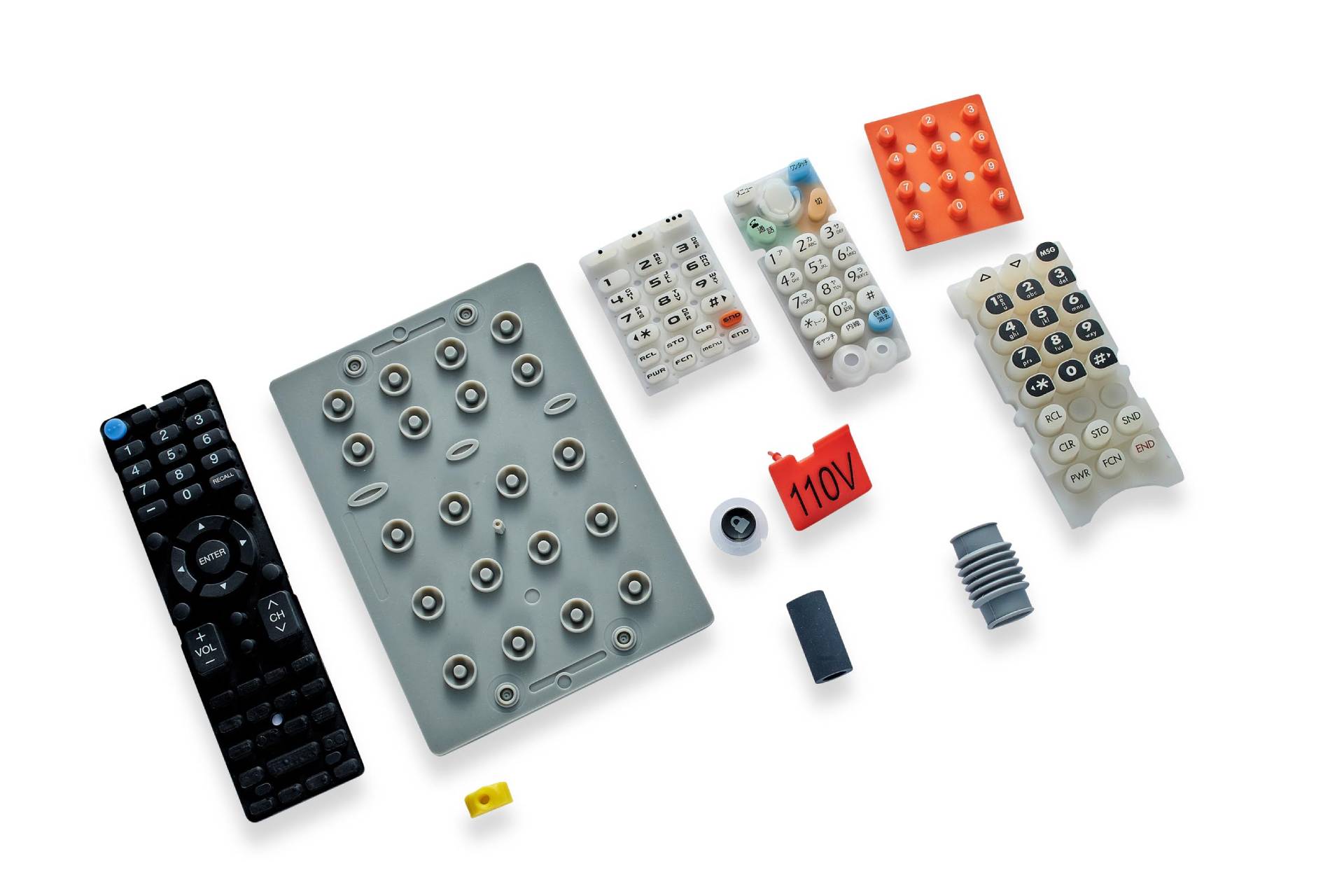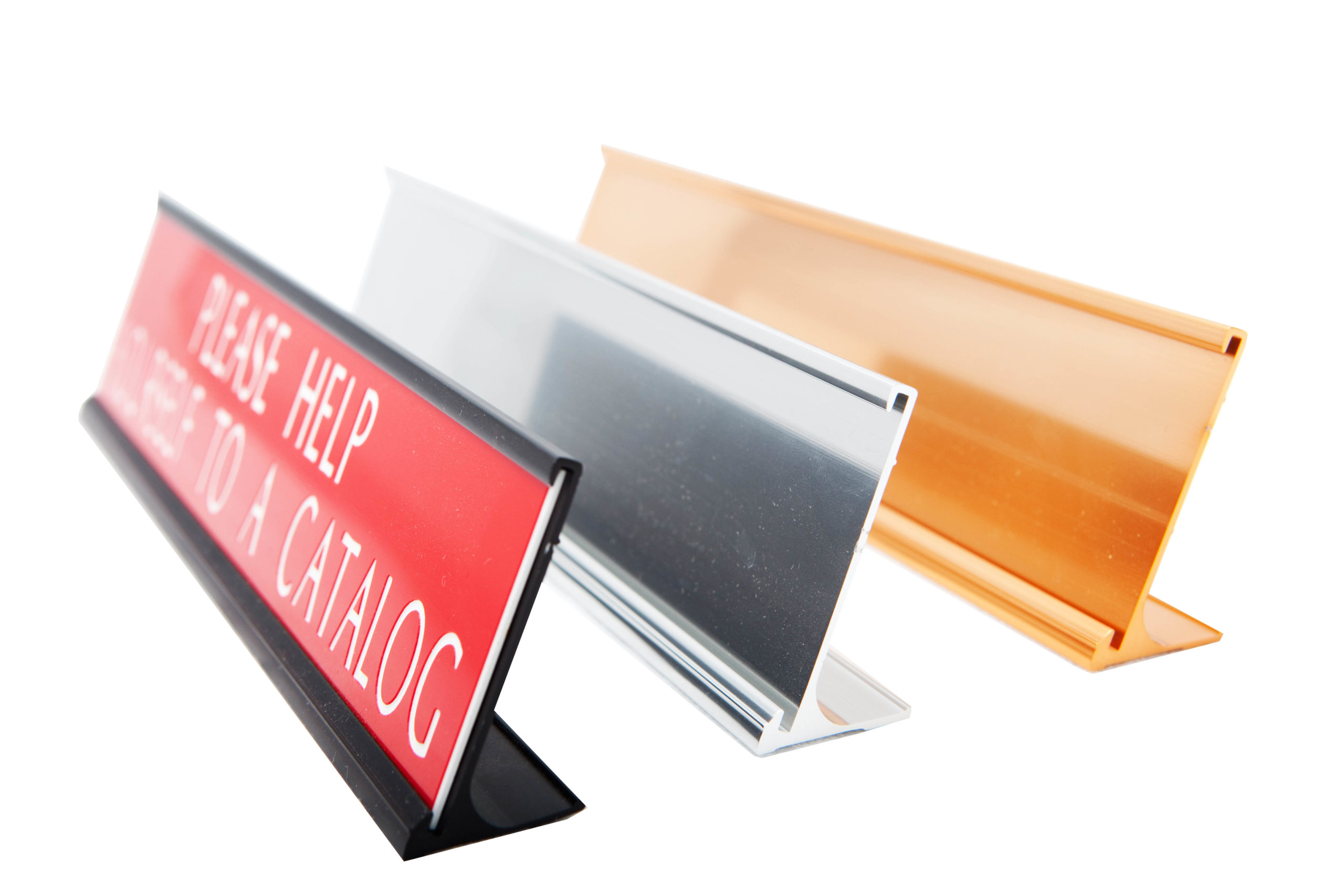How Plastic Nameplates Enhance Customer Experience in Service Roles
How Plastic Nameplates Enhance Customer Experience in Service Roles
Blog Article
Exactly How Plastic Nameplates Are Manufactured: A Comprehensive Overview to Their Manufacturing Refine
The production of plastic nameplates includes numerous specific actions, starting from the selection of appropriate materials to the last finishing touches. Each phase is essential, making sure the item fulfills details needs for durability and looks. Various production strategies play a considerable role in crafting these nameplates. Recognizing these processes can clarify the complexities behind what might appear like a basic item. What elements contribute to the high quality and customization of these nameplates?
Comprehending Plastic Products Used for Nameplates

The Layout Process: From Idea to Prototype
The style procedure for plastic nameplates begins with a clear idea that guides the general production. Designers team up with customers to define the objective, style, and certain demands of the nameplate. This preliminary stage consists of conceptualizing sessions, laying out ideas, and choosing shades and fonts that straighten with branding goals.Once the idea is developed, developers make use of computer-aided design (CAD) software program to develop comprehensive digital depictions. These models allow for visualization and changes prior to moving on. Comments from stakeholders is essential during this stage, as it aids fine-tune the style to satisfy expectations.After wrapping up the digital model, a physical model might be generated, frequently via methods like 3D printing. This substantial representation makes it possible for additional evaluation of aesthetics and capability. In general, the design procedure is a necessary step that lays the structure for the reliable manufacturing of top quality plastic nameplates.
Reducing and Forming the Plastic
In the cutting and shaping stage of plastic nameplate manufacturing, the choice of products plays a crucial role in determining the last item's top quality and resilience (Plastic Nameplates). Numerous accuracy reducing techniques, such as laser cutting and CNC machining, assurance that the plastic is shaped with accuracy and uniformity. This mix of mindful material option and advanced reducing methods is essential for producing high-quality nameplates

Product Selection Process
Choosing the best product is crucial for creating top quality plastic nameplates. Numerous kinds of plastics are offered, each offering distinctive benefits and features. Typical selections consist of acrylic, polycarbonate, and PVC. Polymer is preferred for its quality and UV resistance, making it optimal for outdoor applications. Polycarbonate, known for its resilience and impact resistance, is suitable for environments that require improved protection. PVC is frequently picked for its cost-effectiveness and versatility in layout. The choice process also thinks about factors such as surface, density, and shade finish, which can considerably affect the last appearance and functionality of the nameplate. Eventually, the selected product should align with the intended usage and visual objectives of the plastic nameplate.
Accuracy Trimming Methods
While picking the proper product lays the groundwork, accuracy cutting strategies play a necessary duty in forming the plastic nameplates into their last types. Various methods, consisting of laser cutting, CNC milling, and pass away cutting, are employed to attain accuracy and consistency. Laser reducing utilizes concentrated light to generate complex styles and tidy sides, suitable for intricate patterns. CNC milling offers flexibility by eliminating excess product with precision, accommodating numerous thicknesses and shapes. Die cutting, on the other hand, allows for mass production of uniform pieces, boosting performance. Each strategy is chosen based on the design requirements and the desired coating, ensuring that the end product fulfills top quality requirements and customer assumptions while keeping sturdiness and aesthetic allure.
Printing Strategies for Personalization
Exactly how can manufacturers accomplish accurate and vibrant styles on plastic nameplates? The response lies in various printing strategies customized for modification. Digital printing has actually gotten popularity because of its capability to create detailed styles and high-resolution images straight onto plastic surface areas. This approach enables fast turnaround times and marginal setup expenses, making it optimal for short runs and individualized orders.Screen printing stays an additional commonly utilized strategy, especially for bigger quantities. It includes producing a stencil and applying layers of ink, resulting in rich shades and toughness. UV printing, which uses ultraviolet light to cure the ink, is likewise reliable, giving outstanding attachment and resistance to fading.Additionally, pad printing offers adaptability for irregularly shaped nameplates, permitting for thorough styles on difficult surfaces. These printing techniques make it possible for makers to satisfy diverse customer requires while guaranteeing top quality and longevity in their plastic nameplate items.
Surface Therapies and Finishing Options

High Quality Control Actions in Production
Guaranteeing the highest criteria of high quality control during the manufacturing of plastic nameplates is important for maintaining product honesty and consumer fulfillment. Suppliers execute extensive evaluation protocols at different stages of the manufacturing procedure. Raw materials undertake comprehensive testing to verify they satisfy specifications for resilience and shade consistency. Throughout the molding stage, automated systems keep an eye on specifications such as temperature level and pressure to avoid defects.In addition, aesthetic inspections are conducted to recognize any type of surface area flaws or misalignments. When the nameplates are generated, they go through useful examinations, consisting of attachment tests for printed components and stress examinations for durability. Quality assurance groups often utilize analytical tasting techniques to assess sets, making certain that any variances from requirements are promptly attended to. This comprehensive technique not just improves product quality but additionally fosters trust with clients, verifying the maker's commitment to quality in every nameplate generated.
Product packaging and Circulation of Finished Nameplates
The product packaging and circulation of finished plastic nameplates are crucial action in ensuring they reach clients in perfect condition. Different product packaging products are chosen to secure the nameplates during transit, while shipping techniques are meticulously chosen based on effectiveness and cost-effectiveness. In addition, reliable storage space options are applied to preserve top quality until the nameplates are supplied.
Product Packaging Materials Used
When dispersing finished plastic nameplates, from this source choosing ideal packaging products is essential to guarantee their defense during transit. Frequently used materials include bubble cover, foam padding, and cardboard boxes, all created to support the nameplates versus shocks and impacts. Bubble cover gives an adaptable barrier, while foam extra padding warranties that nameplates continue to be securely in position, minimizing the risk of scrapes or damage. Additionally, durable cardboard boxes are made use of to contain the nameplates, using Related Site structural assistance and defense from exterior aspects. Labels might be put on indicate managing directions or fragile components, even more improving safety and security throughout transport. Generally, making use of top quality packaging products considerably contributes to the stability and discussion of the ended up plastic nameplates upon arrival at their location.
Delivering Approaches Employed
Effective distribution of finished plastic nameplates depends on various delivery approaches that guarantee prompt and safe shipment. Firms usually utilize courier solutions, products delivery, and post offices, relying on the dimension, weight, and location of the plans. For local shipments, courier solutions supply rapid transportation, ensuring nameplates get to clients rapidly. For bigger orders, freight delivery is liked, making use of trucks or delivery containers to deliver mass amounts efficiently. Postal services offer as a cost-effective option for smaller shipments, especially for residential deliveries. All shipping methods prioritize protective product packaging to stop damage throughout transportation. Tracking systems are additionally used to keep track of shipments, offering customers with real-time updates and reassurance concerning the status of their orders.
Storage Space Solutions Implemented

Regularly Asked Inquiries
What Sorts Of Companies Commonly Utilize Plastic Nameplates?
Plastic nameplates are generally used by various companies, including workplaces, medical facilities, colleges, and factories. These nameplates offer necessary functions such as identification, details screen, and branding, adding to organizational performance and expert look throughout diverse environments.
For how long Does the Entire Manufacturing Refine Take?
The production process period differs based on complexity and amount, usually varying from a couple of days to several weeks. Elements affecting this timeline consist of style authorization, material accessibility, and production techniques employed by the business.
Can Plastic Nameplates Be Recycled After Use?
Plastic nameplates can be recycled, supplied they are made from recyclable products. However, the accessibility of reusing programs and regional policies may affect their recyclability. Correct disposal techniques are vital to assure effective recycling.
What Are the Ecological Impacts of Plastic Nameplate Production?
The ecological effects of plastic nameplate manufacturing consist of carbon exhausts, source depletion, and contamination from manufacturing processes. Plastic Nameplates. Furthermore, inappropriate disposal contributes to plastic waste, detrimentally influencing environments and wild animals, highlighting the requirement for sustainable practices
Are There Any Security Problems With Plastic Nameplates?
Safety concerns concerning plastic nameplates mostly include possible chemical exposure during production and the risk of materials degrading over time, which may lead to harmful substances being launched, impacting both human health and the setting. While numerous products can be utilized for nameplates, plastic remains a preferred selection due to its flexibility and longevity. In the cutting and forming phase of plastic nameplate manufacturing, the choice of materials plays an important role in determining the last product's quality and sturdiness. Choosing the right product is necessary for generating high-grade plastic nameplates. While selecting the ideal product lays the groundwork, accuracy cutting techniques play an essential function in shaping the plastic nameplates right into their final forms. When dispersing completed plastic nameplates, selecting ideal product packaging materials is crucial to guarantee their defense throughout transit.
Report this page